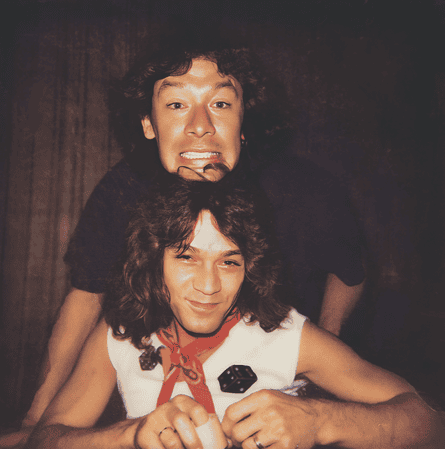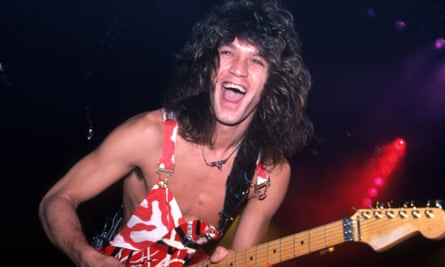For the last few years, Alex Van Halen has been busy writing a book about his beloved brother, Eddie, with the sincere goal of capturing his sibling’s spirit, purging his own sorrow and moving on.
It hasn’t quite worked out that way. “I’m not done dealing with this yet,” he said. “In fact, I’ll probably be dealing with it until my dying day.”
In the meantime, he has been processing his grief, in part, by talking to his departed brother from time to time, including several instances during this very interview. Periodically in our one-hour talk, the 71-year-old drummer addressed his late brother directly, at times to ladle lavish praise on him, at others to curse him to the sky for the self-destructive behavior he believes had a hand in his demise. “This is probably a spiritually, psychically wrong thing to say,” he said intensely, “but had Ed listened to our dad, he’d still be here. Instead, he did everything he could to fuck that up.”
The lessons Alex alludes to from their dad had much to do with the importance of hard work, the urgency for appreciating life, and the necessity of sitting gracefully with the treasures of your talent. Because Alex feels that, in the end, his brother couldn’t live up to the last of those goals, he includes passages in his book, which he titled Brothers, where he angrily confronts his sibling’s spirit with questions such as: “Do you know how lucky we are? Do you know how fortunate you were to be born with a talent? Maybe you never believed you were worthy of your gift and that’s why you were so self-destructive,” he wrote. “You want to destroy the thing that’s the most precious to you, so you can stop holding on to it for dear life.”
Such passages make Brothers both a highly emotional read and a rich psychological portrait of a family dynamic that, in many ways, defined the lives of both sons. To wit: during the interview Alex mentioned his father nearly a dozen times. “We owe everything to him,” he said. “He was the icon, the one who we respected.”

He was also the one they feared, as well as the one whose own ruinous issues with alcohol informed their own. Small wonder, Brothers winds up telling a far more complex story than its author may even have intended. At once, it’s a story about the power of familial love, the mysteries of genius, via Eddie’s paradigm-shifting approach to the guitar, and the role of the immigrant in America, with all of its related issues of race and class. At the same time, it’s an age-old story of rock‘n’roll excess, told with the ribald humor you’d expect from a band that often served as a synonym for “party”.
From the start, the Van Halen brothers were an insular team of outsiders who, through their music, found a way into the culture so deep, it made them one of the most globally successful rock groups of all time. Their parents were outsiders as well, living between cultures. Their father, a Dutch jazz musician, met their mother, who was Indonesian, in her country and married there. Facing prejudices for their interracial marriage, they chose to raise their family in Holland but later immigrated to seek the American dream in its epicenter of aspiration, Los Angeles. At the time, Alex was eight years old, Ed was six. Neither spoke a word of English. Total immersion in the new culture taught them fast, but at school their deficiencies showed. “Every time we were tested for anything, the low score was always language,” Alex said.
Ed took it to heart, believing he was unintelligent. According to Alex, Ed took everything to heart, internalizing any negative feedback either within the family or outside of it, while his older brother let everything roll off his back. Though they were biracial kids, Alex said they didn’t experience much prejudice growing up due to their neighborhood. “It was Indian, Hispanic, Native American, you name it,” he said. “Our first bass player was Black.”
Interestingly, their biracial identity never became a topic of conversation even after they became world famous. As outsider kids, they knew the power, as well as the pain, of “passing”. “If you don’t mention it, I’m not going to say anything,” Alex said with an ironic laugh. “That’s the way it works.”
At home, the boys had firm roles within the family, with Alex playing the tough protector to sensitive Ed. Due to his role as the elder, Alex had a closer relationship with their father, something that both irked Ed and brought out his competitive side. Ed also felt condescended to by his mother, whose strict standards caused her to judge her younger son harshly at times. Often, writes Alex, Ed felt “like a nobody” in her eyes, though he knew she loved him deeply. Their mother pushed both kids hard to study music, but from the classical world, which they abhorred, rather than the rock‘n’roll one, which they adored. Her zeal for classical music was part of her idealization of “respectable culture, in hopes of winning “acceptance into the white world”, Alex said. That’s also why, to the last of her days, she viewed Van Halen’s raucous music as “a disgrace”.
For the same striving reason, the family always referred to Ed as Edward, a name he used on all the band’s album credits. “He could not stand to be called ‘Eddie,’” Alex said.
The family was poor, forcing their dad to take several jobs, including at a factory where the teenage Alex also worked. There, he instantly noticed class and race distinctions. “There wasn’t a single caucasian person working there,” he said.
The portrait Alex paints of his family is loving but rough and tumble, with the men sometimes reacting to each other violently. Still, Alex betrays not a trace of bitterness about even their toughest interactions. In their worship of their dad, the boys imitated his drinking from an early age. “We were ‘pros’ by the time we were 13,” Alex said with a lingering trace of a boast.

The low status their parents held in society fired a righteous response in the sons to make it big at all costs. Fired by the music they worshipped, primarily by Cream and Led Zeppelin, they would “play from the moment we woke up until the moment we went to sleep”, Alex said.
Given their unwavering worth ethic, and the mega-success it yielded, the Van Halen story represents the ultimate expression of the immigrant dream. For that reason, Alex said he finds the current political targeting of immigrants “offensive”.
As teenagers, the brothers formed Van Halen along with bassist Michael Anthony and singer David Lee Roth. Immediately, nagging differences arose between the music-obsessed brothers and their frontman, who was more drawn to the showy role of entertainer. Though Roth’s clownish behavior often made the brothers cringe, they recognized its commercial power and, so, went along with it. In the book, Alex often disparages Roth’s vocal abilities, saying he could not keep time or, sometimes, sing on key. When they recorded their first album, in 1978, their producer, the legendary Ted Templeman, wanted to fire Roth and replace him with Sammy Hagar. (The latter wound up joining Van Halen after Roth quit in 1985.) That sparked one of many battles the brothers had with Templeman. “He was looking for the Doobie Brothers,” Alex said. “We wanted to be more ‘Led Zeppelin II.’ We wanted to improvise. He wanted us to sound just like his haircut – real tight.”
For their debut album, they had to fight to push through Ed’s solo song Eruption, a one-minute-forty-two-second revelation that fired a revolution in guitar technique. The album became a smash but the lousy contract they signed with Warner Bros. meant that after a 12 month, hugely successful tour to support it, they owed the company $2m and had to rush back to the studio to help make up for it.
Luckily for them, their albums went from strength to strength, sales-wise but, internally, things were coming apart. In the book, Alex barely mentions bassist Anthony. When he does, he praises him more for his backup singing than for his main instrument. Though Alex calls Anthony “a lovely guy, he just wasn’t part of the equation,” he said.
Roth’s hogging of the spotlight and insistence on emphasizing the razzle-dazzle over the sound, drove the brothers mad, exacerbated by what they saw as his jealousy for Ed’s status as a creative colossus. More, Ed felt hemmed in by Templeman’s discouragement of his solos and his questioning of even songs like Jump, a No. 1 smash that Alex says neither their producer nor Roth thought worthy of recording. There was also tension within each brother between their own tastes (which leaned towards uncompromising acts like Mahavishnu Orchestra and Allan Holdsworth) and their unwavering desire to remain mega-popular. Things came to a head after Ed recorded his iconic solo on Michael Jackson’s Beat It, without telling the others. “What the fuck are you doing playing on that record?” Alex recalled as his response. “Don’t you realize you only have so many great solos in you? Don’t give one to Michael Jackson!’”
According to Alex, Roth used Ed stepping out as an excuse to leave the band. Given how popular the singer had become through the very videos that embarrassed the brothers, it looked like he would have a great career in film and TV, as well as music. But it didn’t work out that way. “He was delusional,” said the drummer. “He’s not an actor.”
Even so, Alex said: “The spiritual part of the band died when Dave left.” That’s why he ended his book in 1985. Though the band went on to have mega-success with subsequent frontman Hagar, he later wrote a scathing book about his time with them. Reacting to Hagar’s complaints, Alex said: “‘Are you really that jealous of Ed? Are you really that scared of him?’ That’s how people act when they try to diminish somebody.”
When Ed died, so did Van Halen, though Alex still hopes to find a vehicle for some unreleased music by his brother. His quest provides a useful distraction from his grief. An extra problem he has had in processing it comes from the anger he feels towards his brother for not taking his cancer seriously enough. When Ed was first diagnosed with tongue cancer back in 2000, “rather than going to an oncologist, he went to an oral surgeon who used a blade that could fell a tree to cut part of his tongue out,” Alex said. “Ed, what the fuck are you thinking?”
His brother’s particular reaction to intoxicants, Alex believes, had something to do with his feeling of invincibility. “He could do more drugs than anybody, and still be in top shape the next day,” Alex said. But “the very thing that allows you to live that way makes you think ‘I’m immune from that.’”
In 2020, Edward Van Halen died at age 65. He was one year younger than his dad was when he succumbed to alcoholism. “That says it all right there,” Alex said. “Ed had to prove something.
“Maybe he knew something we didn’t,” Alex said. “Maybe he was just passing through. Ed was an angel in human form.”
In the end, that’s what Alex most urgently wants people to know about his brother. It’s also what he holds most dear in order to cope, along with his belief that Ed lives on in some form, as do their mother and father. “The last person alive has the entire family in him,” he said. “I don’t know if our minuscule brains are capable of seeing it, but they’re there. And I am definitely on the lookout.”
-
Brothers is out on 22 October
Source: theguardian.com





















